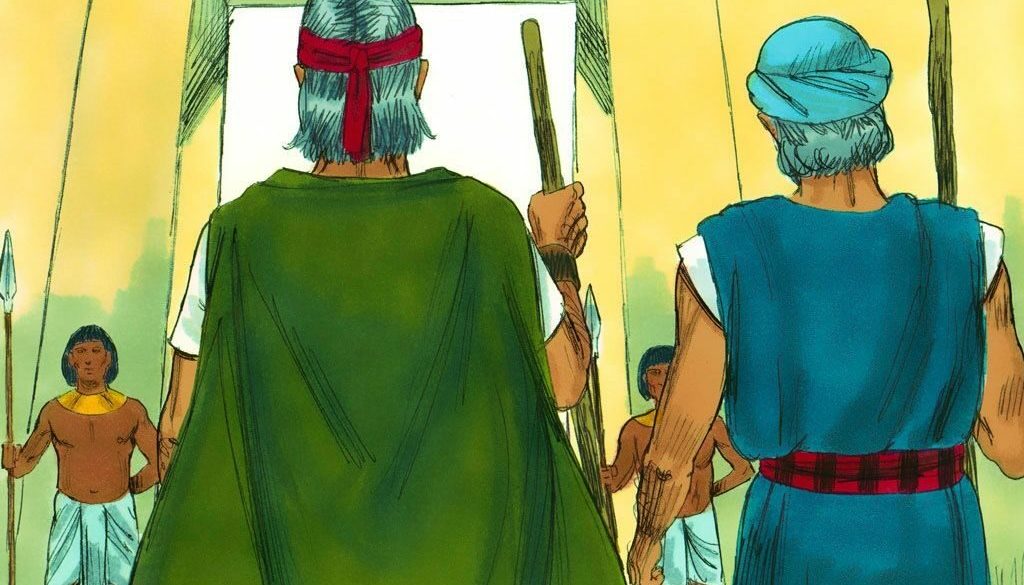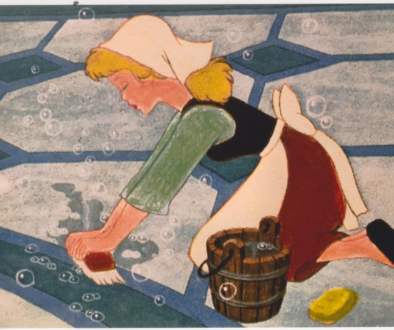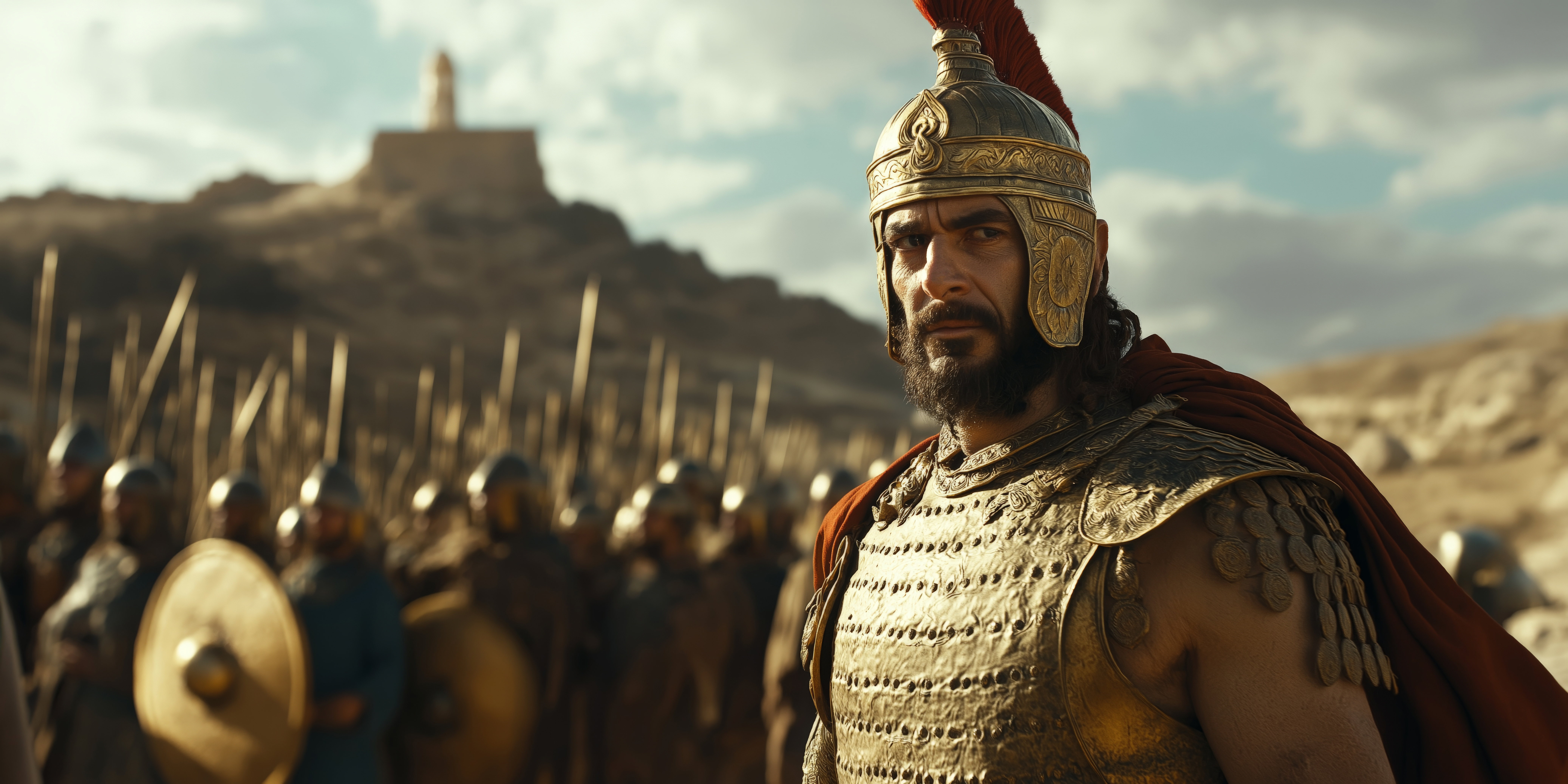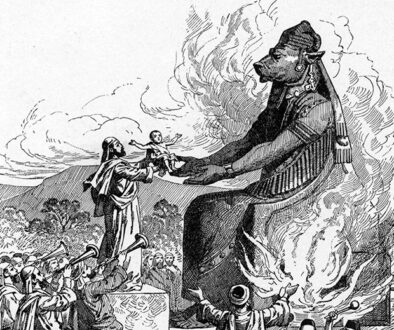Exodus 5 Round 1
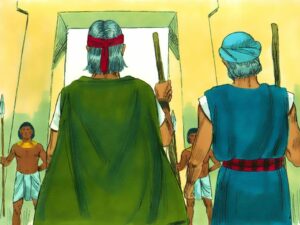
Moses and Aaron are going for Round 1 with Pharaoh. The people are backing them, and all they are asking for is a three day ‘vacation’.
We saw Aaron and Moses meet with the elders of Egypt the last time we were together. Now it is time to stand before Pharaoh. Everyone is expecting a miracle by the end of their time with him. It’s not going to turn out exactly as they expect.
♥ ♦ ♥
The next day Moses and Aaron rise early to take their next step in following God’s command. They dress with care and go to meet with Pharaoh. They went with bold hearts to the court of Pharaoh and requested audience. After waiting to be properly admitted, Aaron and Moses stand before Pharaoh.
This new Pharaoh doesn’t even recognize Moses. He knows nothing of Moses’ crime of killing the Egyptian for beating the Hebrew slave. The original Pharaoh and all those who sought Moses’ life are dead now.
“We bring a message from the God of the Hebrews” says Aaron.
“Really? And just what is this message?”
Aaron advances one step beyond Moses. “Thus says the Lord, the God of Israel, ‘Let my people go, that they may hold a feast to Me in the wilderness’” (verse 1b).
Pharaoh shakes his head and a frown appears on his face. “Who is the Lord, that I should obey his voice and let Israel go? I do not know the Lord, and moreover, I will NOT let Israel go” (verse 2).
Aaron is a little surprised by Pharaoh’s reply. “The God of the Hebrews has met with us. Please let us go a three days’ journey into the wilderness that we may sacrifice to the Lord our God, lest He fall upon us with pestilence or with the sword” (verse 3).
Pharaoh’s face reddens as his anger rises. “Moses and Aaron, you are taking the people away from their work with this talk. There are many people in the land and you are getting them all excited about taking a ‘journey to worship their God’. They are neglecting their work and being idle! NO! I will NOT let them go! Get out of my presence.”
Moses and Aaron are roughly escorted from Pharaoh’s court and deposited back on the streets of the city. “Well, that didn’t go how I had envisioned it” says Aaron.
“The Lord did say that Pharaoh would not easily release our people. Maybe He will visit him in a dream or something during the night. We must be patient and see what the Lord will do. Besides that, the Lord said that we would perform the signs before Pharaoh and that has not happened yet.”
Meanwhile in Pharaoh’s throne room Pharaoh is muttering to himself about the arrogance of Moses and Aaron to make such a request. “Who do they think they are? I am the god of Egypt! ‘Let my people go’ they say. I’ll show them what I will to do MY slaves!” Pharaoh looks over at his guard and motions for him to approach. “Bring me a scribe immediately and then stand ready to dispatch a command from me to all the taskmasters over the Hebrew people.”
The guard bows and then rushes off to do as he was commanded. Only moments pass between his departure and his return with Pharaoh’s most trusted scribe. “You sent for me my lord” offers the scribe as he bows before Pharaoh.
“Take this down. This is to the taskmasters over the Hebrew slaves. ‘You shall no longer give the people strew to make bricks as in the past; let them go and gather straw for themselves. But the number of bricks they are to make will NOT be reduced for they are a lazy and idle people. They are crying for time to go into the wilderness and offer sacrifice to their God. Let heavier work be laid on them so they won’t even have time to THINK about the words of Moses and Aaron and their God.’” Pharaoh nods his head in appreciation of his own cleverness and sits back in his throne. “Let’s see how they like that!”
As soon as the ink was blotted and dry on the parchment the guard rushed to deliver Pharaoh’s message. By noon all the taskmasters had been apprised of Pharaoh’s edict. The Egyptian taskmasters called the foremen of the people and told them that Pharaoh would not be supplying straw to them any longer. In every instance the foremen cried out for mercy for the people. “How are we to continue to make bricks without straw?”
“Oh you will have straw all right. You will just have to go and get it for yourselves. And the same number of bricks required for each day WILL be met without exception. Now let’s go tell your people the wonderful news!” This engendered a look of glee on the faces of the taskmasters and one of fear on that of the foremen.
All the people were assembled so that no one could claim confusion or ignorance of Pharaoh’s command. The taskmasters and foremen stood before the people. The lead taskmaster stepped forward to address the people. “This is what Pharaoh says to you, ‘I will not give you straw. Go and get your stray yourselves wherever you can find it, but your work will not be reduced in the least.’ Now get busy! There is work to be done!”
Grumbling could be heard throughout the crowd but the people set about the task of finding straw. They quickly assigned the new task of straw gathering to their various groups and began to scour the country for the materials they needed. Initially they tried going to the storehouses but those were off limits through Pharaoh’s command. Apparently not only was he not going to have straw delivered but they were not to access any straw the Egyptians had stored either. They had to gather stubble for straw; the leavings after the reaping.
Those gathering straw could not keep up with the demand. The brick makers were falling further and further behind. They initially tried stretching the amount of straw they had by using less of it for each brick but the quality of the brick declined to the point that they were not acceptable.
In the beginning the people buoyed themselves with the promises of Moses and Aaron. Yes, the news had spread throughout the people, in spite of Aaron’s warning. As day after day of Pharaoh’s new demands heaped upon the backs of the people they began to lose hope.
Three days into this new oppression, beatings became so common place that they were expected at every turn. The taskmasters beat the foreman demanding they meet their quotas. The foremen then turned on the people under them.
By day five the people knew there was no way they could ever recover from the loss of straw for meeting their daily quota. They were behind by more than a full day’s work and that gap continued to grow with each hour they were denied the required supplies. Finally they decided to appeal to Pharaoh as a group. They prayed he would have mercy on them and return their straw or at least decrease their production demands.
Pharaoh hears the angry mob outside his palace and calls for his guards. “What is this noise? What is going on out there?”
“It is a group of Hebrew foremen and slaves. They are asking for audience with you. They wish to discuss your latest command regarding straw.”
“Is that so? Have them come in but I insist they do so in an orderly fashion. If they cannot abide by that then they can simply return to work.”
The people enter quietly into Pharaoh’s presence. Their leader steps forward to address Pharaoh when commanded to do so.
“What is it Pharaoh, your god, can do for you?”
“Lord Pharaoh, why do you treat your servants so harshly? You give us no straw but we are told to ‘Make bricks!’ Then we are beaten when we cannot fill your quotas. It is not the fault of your servants we are falling behind but of your own people for withholding necessary supplies.”
“You are a lazy and idle people! You have so much time on your hands that you say, ‘Let us go and sacrifice to the Lord.’ I am the god of Egypt! Meet MY demands! Sacrifice yourselves to ME! Go back to work! No straw will be given to you and not one brick will be lifted from your daily quota!”
The foremen and workers knew their hope was lost. There would be no arguing with Pharaoh. Why had Moses and Aaron gone to Pharaoh in the first place? This wasn’t the beginning of freedom as they had been promised but the beginning of their death.
During this whole time under Pharaoh’s new demands, Moses and Aaron had been laboring right beside their brothers. They had felt the weight of the absent supplies as well. When the delegation went to Pharaoh to plead their case Moses and Aaron had followed. They waited outside Pharaoh’s court to hear how the group had faired for the people. They also prayed while their brothers stood in Pharaoh’s presence.
As the delegation of workers are escorted from Pharaoh’s palace, they notice Moses and Aaron waiting for them. The two men have an expectant look on their faces as the first of the group emerge. As the remaining group leaves Pharaoh’s palace it is clear that they have not met with success. Anger is written on each face where hope once lingered.
“You made Pharaoh HATE us! It is your fault that he has turned on us like this! He is trying to kill us and you put the sword in his hands with your demands! May the Lord rain down judgement on you for what you have done to us!”
The people pushed past Moses and Aaron nearly knocking them down. Moses hung his head in shame. The two men returned to the family home with heavy hearts. As soon as Moses was alone in the garden he began to call out to God.
“O Lord, why have You done evil to this people? Why did You ever send me? Since I came to Pharaoh to speak in You name he had done evil to this people, and You have not delivered Your people at all” (verses 22-23).
(to be continued)
I feel for the people. To have a promise and then have all vestiges of it snatched away from you and your situation made even worse is beyond disheartening. And yet, those of us on the other side of the story judge those living in it. I know I have on many occasions. My harshest judgements are reserved for their attitudes AFTER leaving Egypt, but that is for another day. Today I’m right there with them as they cry out for mercy from Pharaoh. The god who had none. I feel their anger with Moses for getting their hopes up only to be pushed down even further.
My husband and I had something disheartening happen to him. It wasn’t on the scale of what Israel was going through but it was very difficult for us nonetheless. He had been suffering in pain for nearly 18 years when one doctor finally offered him hope. He was told of a surgery that could hopefully reduce his pain. We were ecstatic! We did every test and preparation required to receive the surgery. And then we were told to wait. We waited and Waited and WAITED. It felt like years during this stage but really it was only months. When hope was finally on the horizon it was snatched away again by the doctor saying that maybe this wasn’t the best option and that my husband should see another doctor for an alternate option.
The other doctor was consulted and a better course of action was decided. Things moved fast from that point, until the insurance company got involved. They stopped this option in its tracks. I appealed their decision. The doctor appealed their decision. Finally it was decided that we had to go route number three. This route would require the doctor to get special permission to operate in a hospital that had the right equipment for the third surgical, and most complicated option. We waited and Waited and WAITED again. This time it did take years instead of months! Three years to be exact. When hope finally was on the horizon again my husband’s medical status changed. He was no longer a candidate for this surgery. We felt defeated.
I let a couple months go by before broaching the prospect of the original surgery with my husband’s doctor. The doctor agreed to move forward with that one. It took several months before the process was completed but that surgery NEARLY eliminated his pain. After more than 22 years in pain, he is reasonably pain free.
At one point in all this waiting I quoted Proverbs 13:12 to the doctor. “Hope deferred makes the heart sick, but a longing fulfilled is a tree of life.” We made it through the “sickness” and are now enjoying the “tree of life.” Israel will too, just not yet.
Another thing that got my attention was Moses’ reaction. He went to God with his problem, as he should have, but his cry raised my eyebrows. “Why did You send me?” He tried to get out of this mission from the beginning. I don’t know if it really was because he didn’t feel qualified or if he didn’t want the responsibility if something went wrong. This was a HUGE burden to carry. He didn’t even bring up the fact that Aaron stood right beside him when addressing Pharaoh.
The second phrase that caught my attention was when Moses complained that God didn’t set the Israelites free. “You have not delivered Your people at all.” Didn’t God tell Moses IN THE BEGINNING that Pharaoh was going to fight against this? He told him that He was going to have to do some mighty works in-between the first proclamation and eventual freedom. Moses hadn’t even performed any of the signs God had given him for Pharaoh. He sounds like he was already giving up. I guess that Moses had as much growing in faith as Israel had to do at this point.
Father God, I’m SO glad You lead me by the hand in seasons of doubt. You didn’t give up on Moses. You insisted he stay the course. The difference between his reaction and the people’s is where he turned. The people turned to Moses and saw his inability to save them. He turned to You. You had the ability to intervene immediately but that wouldn’t have brought about the growth that was needed.
I’m SO glad You have the full picture to work from! Who knows how life would turn out if Israel got their answer immediately; or me. You know just how much growth/waiting I can stand too. Thank You for never stretching me beyond that point. And that “point” has moved over the years as You brought about growth.
I’m wondering if this is my growing time again with all that has happened with my blog lately. Thank You for reminding me that this is OUR time together too! Not just something I go through as a “service” to You. It is OUR story time. Help me remember to cherish it EVERY DAY! Who knows what You have in store for us up ahead. Right now, You are allowing me to turn Your stories into ‘living’ stories. I PRAY I am doing justice to Your original words.

